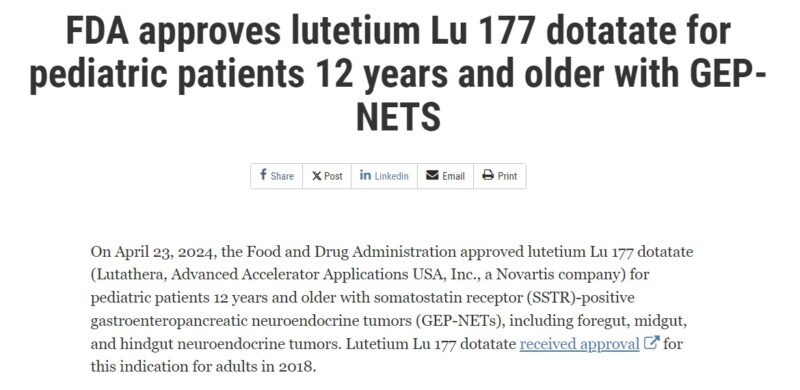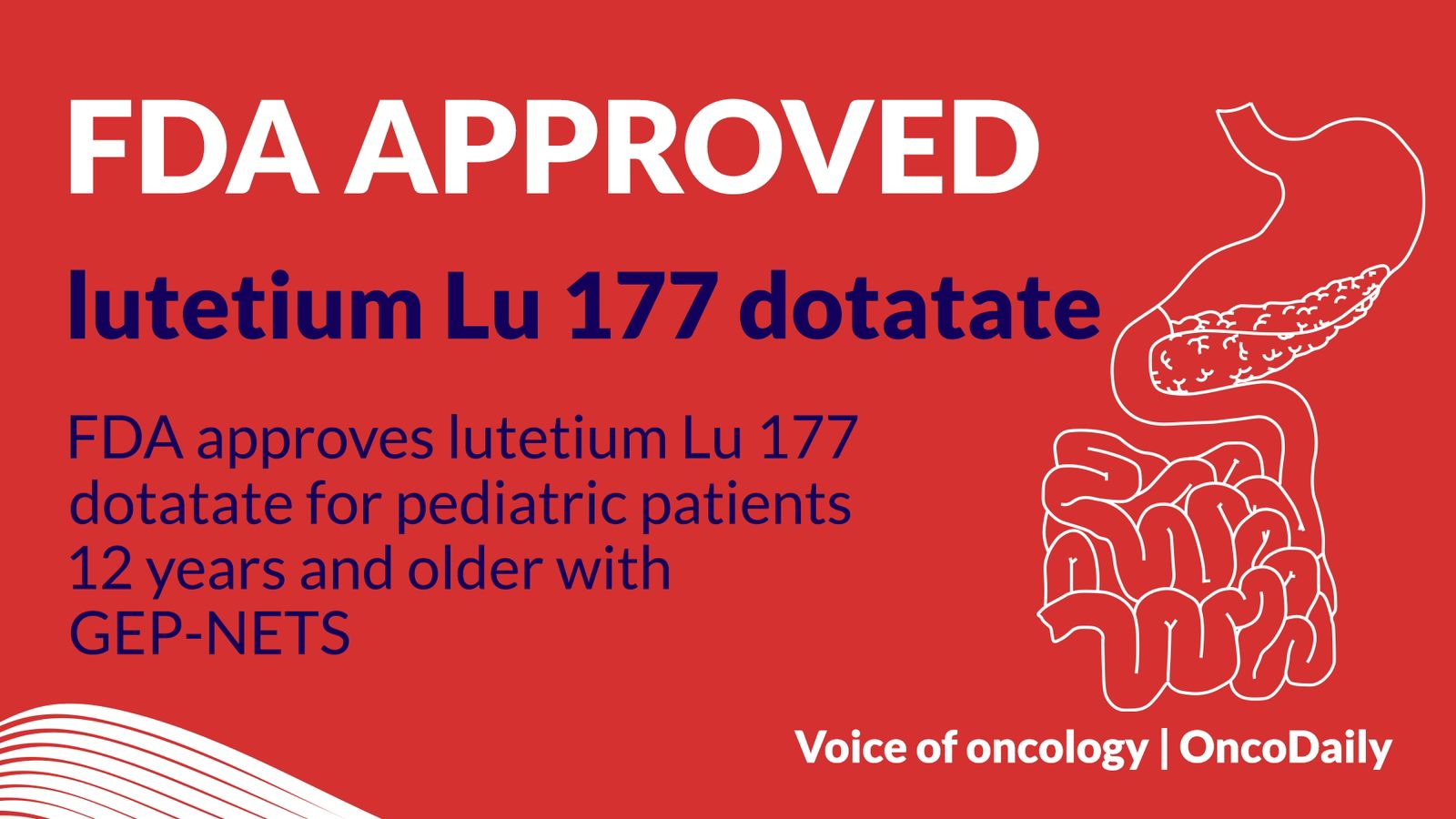FDA Approves the First Radioactive Drug for Pediatric Neuroendocrine Tumors
the U.S. Food and Drug Administration (FDA) granted approval for lutetium Lu 177 dotatate (Lutathera) on April 23, 2024, for the treatment of somatostatin receptor-positive gastroenteropancreatic neuroendocrine tumours (GEP-NETs) in pediatric patients aged 12 years and older. This represents the first FDA-approved radioactive drug, or radiopharmaceutical, for pediatric patients with this type of rare cancer.
In 2018, Lutetium Lu 177 dotatate was approved for use in adults for this medical indication.

About Lutetium Lu 177 Dotatate (Lutathera)
Lutetium Lu 177 dotatate is a radioactive drug that targets and binds to somatostatin receptors, which are overexpressed in GEP-NET cells. Once bound, it delivers targeted radiation to the tumour cells, leading to their death.
You can find more about neuroendocrine tumours and the available treatment options with radionuclide therapy on the Understanding Neuroendocrine Tumors – YouTube by UChicago Medicine.
Basis for Approval
– NETTER-P trial data on pharmacokinetics, dosimetry, and safety in 9 adolescents
– Extrapolation of efficacy outcomes from NETTER-1 trial in 229 adults
– Priority review and orphan drug designation granted
NETTER-P Trial (Clinicaltrials.gov:NCT04711135)
– Ongoing international, multi-center, open-label, single-arm study
– Evaluated pharmacokinetics, dosimetry, and safety in 9 adolescent patients, including 4 with GEP-NETs
– Key Endpoints:
– Absorbed radiation doses in target organs
– Incidence of adverse reactions after the first treatment cycle (data not reported)
– Short-term adverse reactions (data not reported)
Safety Profile
– Generally well-tolerated in pediatric patients
– Adverse reaction profile similar to that observed in adults
– Common side effects include nausea, vomiting, fatigue, and haematological toxicities
Efficacy Based on NETTER-1 Trial in Adults (Clinicaltrials.gov: NCT01578239)
– Randomized, multi-center, open-label trial in 229 adults with advanced midgut NETs
– Demonstrated improved progression-free survival of 28.4 months with lutetium Lu 177 dotatate vs 8.5 months with high-dose octreotide (HR 0.21, 95% CI 0.13-0.33, p<0.001)
– Overall response rate of 18% with lutetium Lu 177 dotatate vs 3% with octreotide
– Supported original FDA approval of lutetium Lu 177 dotatate in adults in 2018
Learn more about the recent approval of Lu 177 dotatate for treatment of GEP-NETs in the ASCO Educational Podcast Series on YouTube. Dr Jonathan Strosberg from the Moffitt Cancer Center discusses the recent FDA approval of Lutetium Lu 177 dotatate for gastroenteropancreatic neuroendocrine tumours in pediatrics .
Original Article on Key results from Netter-1 trial, published in The New England Journal of Medicine, on January 2017
The phase 3, randomized NETTER-1 trial demonstrated the superiority of the targeted radioactive therapy lutetium Lu 177 dotatate (Lutathera) over high-dose octreotide LAR in patients with advanced, progressive midgut neuroendocrine tumors (NETs).
Progression-Free Survival Benefit
/⦁ Estimated 20-month progression-free survival rate:
⦁ 65.2% with lutetium Lu 177 dotatate
⦁ 10.8% with octreotide LAR
⦁ Lutetium Lu 177 dotatate reduced risk of progression or death by 79% vs octreotide (HR 0.21, 95% CI 0.13-0.33, p<0.001)
⦁ Median progression-free survival not reached with lutetium Lu 177 dotatate vs 8.4 months with octreotide
Overall Survival Advantage (Interim Analysis)
⦁ 60% lower risk of death with lutetium Lu 177 dotatate vs octreotide LAR (HR 0.40, p=0.004)
⦁ Data not mature to estimate median overall survival
Higher Response Rates
⦁ Objective response rate 18% with lutetium Lu 177 dotatate vs 3% with octreotide (p<0.001)
Safety Profile
⦁ Most common adverse events: nausea, vomiting, fatigue, abdominal pain
⦁ Grade 3/4 hematologic toxicities in <10% of lutetium Lu 177 dotatate group
⦁ No evidence of renal toxicity (median follow-up 14 months)
Get the latest Overall Survival Updates from the NETTER-1 trial by watching the YouTube interview with Dr. Enrique Grande of MD Anderson Cancer Center Madrid. The interview, conducted during the ASCO 2021 Virtual Meeting, provides insights into the findings after a median follow-up of 6.3 years.
Updated results on Netter-1 trial published in the Lancet on November 2021
⦁ Study Design: Phase 3, open-label involving 231 patients with advanced midgut neuroendocrine tumors.
⦁ Treatment Groups:
⦁ 177Lu-Dotatate: 7.4 GBq every 8 weeks x 4 cycles + long-acting octreotide 30 mg.
⦁ Control: High-dose octreotide 60 mg every 4 weeks.
⦁ Overall Survival:
⦁ 177Lu-Dotatate: Median survival of 48.0 months.
⦁ Control: Median survival of 36.3 months.
⦁ Hazard Ratio: 0.84 (95% CI 0.60-1.17), not statistically significant (p=0.30).
⦁ Consistently higher with 177Lu-Dotatate across all yearly checkpoints up to 5 years. (1-year: 91.0% vs 79.7%, 5-year: 37.1% vs 35.4%)
⦁ 36% of control patients switched to PRRT, adjusting control median survival to 30.9 months.
⦁ Long follow-up of >6 years showed reassuring long-term safety:
⦁ Myelodysplastic Syndrome: 2% incidence in the 177Lu-Dotatate group, no cases of acute myeloid leukaemia.
⦁ Nephrotoxicity: Comparable rates between both groups.
Overall impression:
⦁ 11.7-month longer median OS with 177Lu-Dotatate potentially clinically meaningful despite not statistically significant
⦁ Challenging to show significant OS benefit in this indolent tumor due to:
– Extended survival
– Crossover to PRRT in the control arm
– Subsequent therapies received
⦁ Long-term safety profile
⦁ Despite non-significant OS, combined with significant PFS benefit and QoL gains
Watch Dr. Jonathan Strosberg, the Netter trial PI, discuss who might benefit from Peptide Receptor Radionuclide Therapy (PRRT) for neuroendocrine tumors in this Youtube Interview.
With this approval, pediatric patients with advanced GEP-NETs now have access to targeted radiopharmaceutical therapy, offering a new treatment option for this rare and challenging disease.
Find out more about FDA’s recent approvals on OncoDaily.
